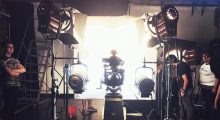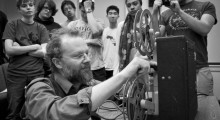Film School
-
How to Ace a Film School Admissions Interview

I turned in this column way late this quarter. My excuse? Admissions. Like film faculty across the country, my colleagues and I in the School of Cinematic Arts at the University of Southern California are reading dozens of applications for a wide variety of undergraduate and graduate filmmaking, screenwriting and media arts programs, and sorting through personal statements, work samples, grades, letters of recommendation and more, trying to sense who might be best for our program and how our program might best suit potential applicants. There are more applications than ever, even though recent analyses suggest that students consider the […]
by Holly Willis on Mar 18, 2024 -
Optimal Value

What’s the main reason to go to film school? You could say to broaden the mind, to learn about cinema history, to meet future collaborators. Those are all true, but at base, the chief reason is to learn a skill. Ideally, you exit your program (whether it’s undergrad or graduate) ready to enter the industry. Perhaps you won’t be doing what you expected when you first applied, but you also don’t want to emerge with no idea what’s next. That said, film school can be tough. There are countless ways to do it, and it can be hard to focus and […]
by Matt Prigge on Jun 19, 2019 -
What I Learned in Film School
I learned a bit about cinema studies while getting an MFA at Columbia in the late 1970s and a good deal more once I began teaching, first at NYU and then Cooper Union, around a decade later. Always curious as to why students wanted to study film to begin with, I gave a standard first assignment that included a request for a description of the first movie that a student remembered seeing in a movie theater. As at least a third of the Cooper students were born outside the United States, the answers were fascinating. Really should have saved them…. […]
by J. Hoberman on Mar 8, 2018 -
Beyond the Boundaries of Language

In recent memory, there’s been a never-ending deluge of bad news for the arts and humanities in the U.S.: government support, which is already low, may be cut entirely; universities, facing budget crises, have axed language and arts programs; prominent professors spend their time writing books defending the basic value of humanistic inquiry, while their pecuniary graduate students fight for poverty wages as adjuncts, and earn a little money on the side writing articles about their plight. In the midst of all this, I was struggling to put together a dissertation proposal — it was something on the history of […]
by Carmine Grimaldi on Jun 16, 2017 -
Pedagogical Praxis

George Bernard Shaw’s famous adage, “Those who do do, those who can’t, teach. He can do, does. He who cannot, teaches,” fails when it comes to film schools. Scratch the surface of most film school faculty lists, and you’ll find filmmakers who not only do but are also doing. Developing scripts, raising financing and shooting while on sabbatical, university-ensconced independent filmmakers have one foot in the ivory tower and one foot in the shape-shifting world that is today’s independent film production. Inevitably, then, they bring their hard-fought wisdom into the classroom, which means they must also grapple with one tough […]
by Scott Macaulay on Jun 16, 2017 -
VR.edu

When I studied at the London Film School just over a decade ago, students originated all of our projects on 35 and 16mm film and cut them on Steenbecks and Avid Media Composer. What a difference a dozen years make: Now schools have moved beyond the digital video revolution and computer animation to whole new media and formats. Virtual, augmented and mixed reality are forming increasingly large components of university curricula, giving a shot of innovation to narrative filmmaking in the academy and bringing university computer science programs into the realm of traditional film schools. You might expect VR courses […]
by Randy Astle on Jun 16, 2017 -
Film Schools in a Time of Disruption

At YouVisit Studios in midtown Manhattan, Ben Leonberg, Scott Riehs and Alice Shindelar, three recent graduates of the film MFA program at Columbia, bring their education to bear in rather unexpected ways. They are still, in a sense, filmmakers — Leonberg a creative director, Shindelar a writer/director and Riehs a creative producer, each aspiring to one day make a feature. But as their day job they practice filmmaking of a very different type: together they conceive, write and shoot commercial content that YouVisit calls “interactive virtual experiences.” They work in 360-degree video and with virtual-reality headsets. They experiment with new […]
by Calum Marsh on Jun 16, 2017 -
Big Data and the 25 Best Film Schools

Big Data — the term is everywhere right now. Sometimes used as a shorthand for the companies that are in the business of collecting, aggregating and sifting through large data sets (often comprised of personal info), it more properly refers to the data sets themselves — collections of information so gigantic they require advanced technologies to interpret. There’s much creepy potential in Big Data, but it is here to stay. The question, then, is whether the technologies of Big Data can be marshaled for progressive and creative goals. At Arts Fwd, Erinn Roos-Brown argues that arts organizations can learn from […]
by Scott Macaulay on May 6, 2013 -
Better Living Through Cinema

It’s a Friday morning, and David Gatten is very tired, having taught both Wednesday and Thursday evenings. Like many filmmakers, in addition to making movies, Gatten also teaches. Indeed, the experimental filmmaker boasts the title “Lecturing Fellow and Artist in Residence” at Duke University’s Arts of the Moving Image program, where he lectures during the spring semester, before returning to the old mining cabin in Colorado’s Four Mile Canyon where he lives with his wife — filmmaker, writer and editor Erin Espelie — for the rest of the year. His courses? AMI 101: Introduction to the Arts of the Moving […]
by Holly Willis on Apr 23, 2013 -
FALL ’11 ISSUE ONLINE
Select stories from our Fall issue are now available. You can now read online our interviews with Melancholia‘s Lars von Trier (before announcing he would no longer give interviews), Sean Durkin and Elizabeth Olsen chat about Martha Marcy May Marlene, we get biblical about The Catechism Cataclysm with thoughts from the Reverend Megan Hollaway and we look at what film schools need to achieve to be relevant in the future. Plus, the Culture Hacker and Industry Beat columns. The issue hits stands next week, but you can read it now on your desktop by subscribing to our digital issue. Learn […]
by Jason Guerrasio on Oct 24, 2011








